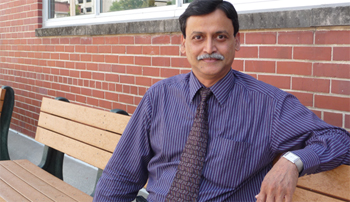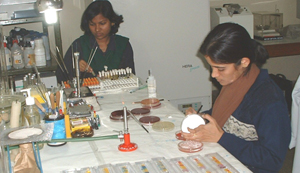As we continue our National Public Health Week coverage, we spotlight UNMC professionals who have joined the World Health Organization (WHO) efforts to tackle antimicrobial resistance.
According to WHO, the problem is becoming more dangerous.
 |
Pinaki Panigrahi, M.D., Ph.D. |
Why is antibacterial resistance a problem in the United State and worldwide?
Increasing use of antimicrobials in humans, animals and agriculture has resulted in many microbes developing resistance to these powerful drugs. Between five and 10 percent of all hospital patients develop an infection, leading to an increase of about $5 billion in annual U.S. health care costs. About 90,000 of these patients die each year as a result of their infection, up from 13,300 patient deaths in 1992.
 |
Researchers in a laboratory in India conduct antimicrobial resistance research. |
How is your research tackling this problem?
Our research examined drug resistance during early infancy in babies born in Indian villages and tribal areas. There are alarmingly high numbers of babies born with a type of resistance that is generally found in hospitals. Their resistance may be due to transmission from the environment or from immediate caregivers who have been treated indiscriminately with antibiotics. In countries such as India, antibiotics are available without a prescription.
Careful surveillance of infections and judicious use of antibiotics and alternative methods are the first steps in tackling this problem. Additionally, we discovered microbicides, rather than antibiotics, can play an important role in this effort.
This month, some of our work in this area was published in the Journal of Medical Microbiology.
Why is a global health center at UNMC important for students and faculty?
We live in a world without borders and lessons learned from one geographic location are applicable to another. Our center will help prepare the next generation of health and public health experts to handle problems of any magnitude, whether local, national or global in nature.